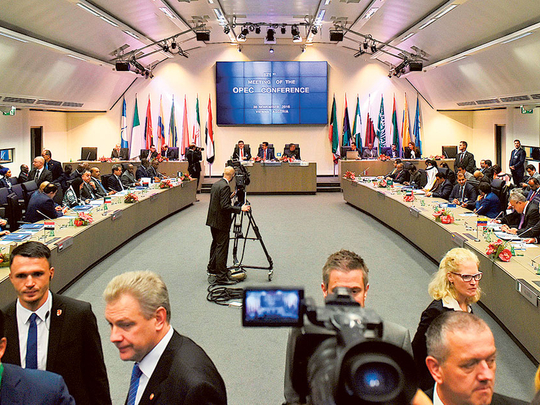
Abu Dhabi: Opec member countries buried their differences to come to an agreement on production cuts as their economies were badly hit due to low oil prices, analysts said.
From more than $110 (Dh404) per barrel in mid-2014 oil plunged to less than $50 per barrel in recent times hitting the economies of oil producing countries very badly with social unrest in Venezuela and budget deficit in Saudi Arabia.
“The deal was achieved as all the Opec members and Russia have been suffering badly from the steep decline of the oil prices since July 2014,” said Dr Mamdouh G Salameh, a London based oil economist.
He said Saudi Arabia wanted the deal as its economy was suffering most from the huge reduction in oil income and from its strategy of flooding the global market with oil to achieve some political goals.
“There was also credibility factor involved. Opec needed some success to show the world that it still matters and has not become irrelevant.”
In the agreement reached on Wednesday by the fourteen member group, Saudi Arabia will share the maximum burden of reducing output by about 0.5 million barrels per day followed by Gulf countries like Kuwait, Qatar and the UAE.
Russia which is not part of the group has also agreed to cut production by about 300,000 barrels per day.
The Opec countries agreed to slash output by 1.2 million barrels per day from January 1 next year as per the deal. Additional 600,000 will be cut by non-Opec countries.
Oil prices are trading higher following the agreement. On Thursday, Brent, the global benchmark went up by more than 8 per cent to trade at $50.47 per barrel at around 2:30pm UAE time. US crude West Texas Intermediate is up by more than 1 per cent at $50.01 per barrel.
Jonathan Chan, an analyst at Singapore based Phillip Futures also said economic factors played an important role in the deal adding that Saudi Arabia, Russia have taken the lead in initiating this deal by sacrificing the most.
“This is probably brought about by the economic hardship they have suffered over the last 3 years of reduced oil revenue to their national coffers,” he told Gulf News by email.
Meanwhile, Fitch Ratings on Thursday said Opec agreement should help accelerate market rebalancing and increases the chances of more rapid oil price recovery than previously expected.
But it warned that implementation risks remain, including Opec’s adherence to the agreement and the willingness of other participants, notably Russia, to cooperate fully.
“These issues and US oil production dynamics will be key drivers of the oil price direction in the medium term,” it said.












